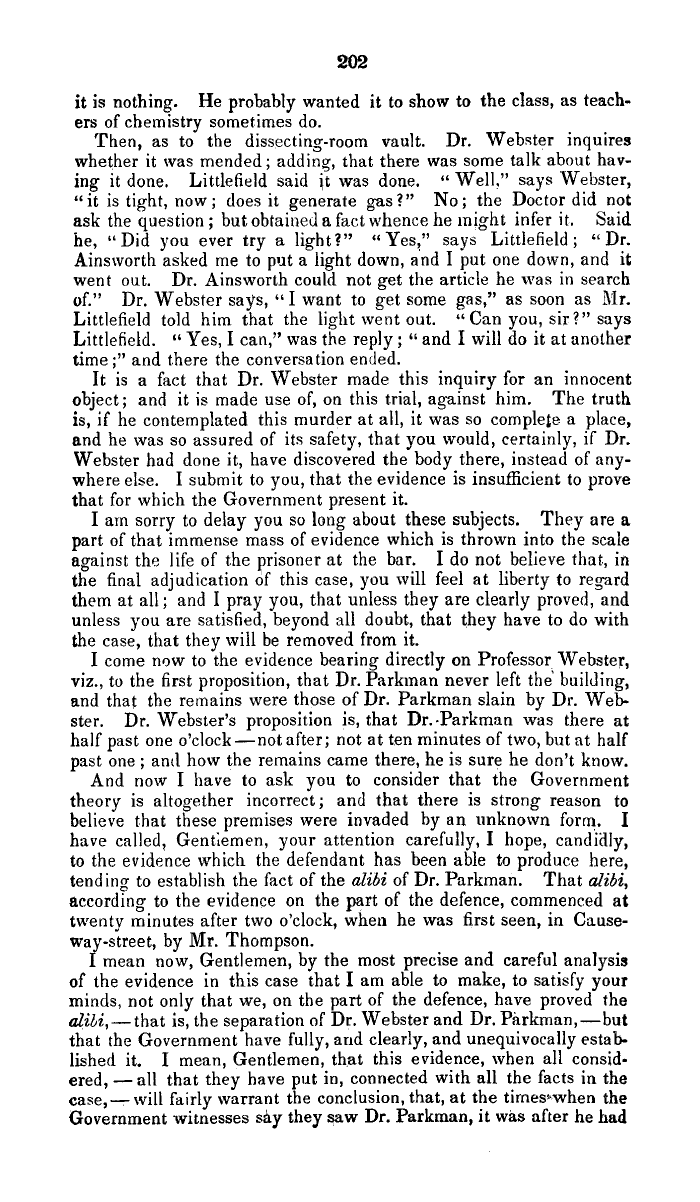|
202
it is nothing. He probably wanted it to show to the class, as teach-
ers of chemistry sometimes do.
Then, as to the dissecting-room vault. Dr. Webster inquires
whether it was mended; adding, that there was some talk about hav-
ing it done. Littlefield said it was done. '° Well," says Webster,
"it is tight, now; does it generate gas?" No; the Doctor did not
ask the question ; but obtained a fact whence he might infer it. Said
he, °' Did you ever try a light?" "Yes," says Littlefield ; °~ Dr.
Ainsworth asked me to put a light down, and I put one down, and it
went out. Dr. Ainsworth could not get the article he was in search
of." Dr. Webster says, 1° I want to get, some gas," as soon as :1Ir.
Littlefield told him that the light went out. '° Can you, sir?" says
Littlefield. °' Yes, I can," was the reply; '° and I will do it at another
time ;" and there the conversation ended.
It is a fact that Dr. Webster made this inquiry for an innocent
object; and it is made use of, on this trial, against him. The truth
is, if he contemplated this murder at all, it was so complete a place,
and he was so assured of its safety, that you would, certainly, if Dr.
Webster had done it, have discovered the body there, instead of any-
where else. I submit to you, that the evidence is insufficient to prove
that for which the Government present it.
I am sorry to delay you so long about these subjects. They are a
part of that immense mass of evidence which is thrown into the scale
against the life of the prisoner at the bar. I do not believe that, in
the final adjudication of this case, you will feel at liberty to regard
them at all; and I pray you, that unless they are clearly proved, and
unless you are satisfied, beyond all doubt, that they have to do with
the case, that they will be removed from it.
I come now to the evidence bearing directly on Professor Webster,
viz., to the first proposition, that Dr. Parkman never left the building,
and that the remains were those of Dr. Parkman slain by Dr. Web.
ster. Dr. Webster's proposition is, that Dr..Parkman was there at
half past one o'clock-not after; not at ten minutes of two, but at half
past one ; and how the remains came there, he is sure he don't know.
And now I have to ask you to consider that the Government
theory is altogether incorrect; and that there is strong reason to
believe that these premises were invaded by an unknown form. I
have called, Gentiemen, your attention carefully, I hope, candidly,
to the evidence which the defendant has been able to produce here,
tending to establish the fact of the alibi of Dr. Parkman. That alibi,
according to the evidence on the part of the defence, commenced at
twenty minutes after two o'clock, when he was first seen, in Cause-
way-street, by Mr. Thompson.
I mean now, Gentlemen, by the most precise and careful analysis
of the evidence in this case that I am able to make, to satisfy your
minds, not only that we, on the part of the defence, have proved the
alibi,-that is, the separation of Dr. Webster and Dr. Parkman,-but
that the Government have fully, and clearly, and unequivocally estab.
lished it. I mean, Gentlemen, that this evidence, when all consid-
ered, - all that they have put in, connected with all the facts in the
case,-will fairly warrant the conclusion, that, at the times~when the
Government witnesses shy they saw Dr. Parkman, it was after he had
|

